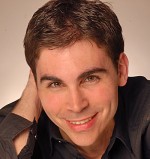Column Name
Title
Like many people at Juilliard, doctoral candidate Dan Kurland is both a student and a professional musician, in his case a collaborative pianist (dankkurland.com). The Chicago native recounts a day of school and work as he gears up for his December 11 recital.
Body
6:15 a.m. I pour myself a cup of coffee—the most welcome aroma in the morning—and check overnight messages and news. A singer for whom I’ve recently played many auditions has asked me to play his audition for the Geneva Opera in a few weeks!
7:04 a.m. Having breakfasted on Honey Nut Cheerios, sent a few more e-mails, showered, and made my bed—coming home to a made bed is incredibly welcoming—I debate what to wear. Since I’m playing at an event this evening, I decide to sport an ever-so-slightly shiny suit with a black dress shirt. Plus colorful socks. I love colorful socks.
8:13 a.m. Having taken the (incredibly crowded) subway downtown to school, I make today’s to-do list and schedule. I’m lost without it.
8:15 a.m. Morning practice time. Sacred time. I need to practice for my recital: Beethoven and Debussy, as well as Wagner, Offenbach, and Bizet arias. Time management is key.
10 a.m. I’m in the library working on French translations for the Baudelaire songs of Debussy, for my recital. It can be hard to play a song if you don’t know what the text means, and while I speak French, it’s exciting to consult multiple editions of English translation as well as the French dictionary. I’m constantly fascinated by this language.
10:32 a.m. Raquel González is able to fit in a brief rehearsal before our 11 a.m. classes. She’s a great friend and performed Schubert and Boulanger songs with me on my recital last February (they were sublime in her voice). Now working on them for my next recital, but today we’re rehearsing Berlioz’s “Spectre de la Rose,” one of our mutually favorite songs, for an upcoming audition of hers.
11 a.m. At Professor [James] Kurtz’s doctoral Renaissance History class, we engage in a lively and fascinating discussion about Josquin de Prez’s Salve Regina and Nicolas Gombert’s Ave Regina Caelorum and how they relate to music today. We’re seeing that the so-called ‘structural scaffold’ of a cantus firmus has gone out of fashion in this music and that composers are writing a little more freely. Out with the old, in with the new.
12:04 p.m. Several of my classmates and I give a lively group rendering, singing the 15th-century composer Marchetta Cara’s “O mia cieca e dura sorte” in four-part harmony. Much of this music hasn’t been recorded, but we can learn a lot from singing and hearing other parts around us. Turns out we’re not too bad for a bunch of instrumentalists!
12:57 p.m. A singer calls to ask if I can play an audition for him in a few weeks. It’s nice to hear from him, but while I know most of the arias he’ll be singing, I won’t be available, unfortunately.
1:07 p.m. Tonight I’m playing at a party for a Glimmerglass Festival board member—I was a Young Artist there this summer. I run to the copy center to cut pages and make the order for tonight’s songs.
1:12 p.m. I fetch my lunch—a sandwich I made this morning with Trader Joe’s yummy aioli garlic mustard—from the refrigerator and eat with my friend and fellow doctoral student Jared Miller. We need to plan a dinner party we’re hosting in just two days. He volunteers to do the shopping and I’m happy as a clam.
2:01 p.m. Dr. [Philip] Lasser’s class on Analytical Methods begins with him telling us a Descartes joke that makes the room erupt in laughter. And [composition doctoral student] Max Grafe’s presentation on Descartes is fascinating.
3:50 p.m. Class concludes, and eventually the practice room fairies smile upon me and Chelsea Smith—we’re each playing Beethoven’s C-minor Violin Sonata for our recitals. We found that out serendipitously —one day I heard her practicing the famous, ominous opening of the sonata and knocked on her practice room door—and now we’ve been working on it together. I feel like there’s a respectful and articulate way in which we talk about our ideas. And we laugh a lot, which is important.
5:26 p.m. I head to the subway to go to midtown for the event, a book party for an architecture firm that’s celebrating its anniversary.
6 p.m. Sharin Apostolou, a soprano with whom I worked at Glimmerglass, and I get in the elevator and our ears pop as we ascend to the penthouse, on the 60th-floor. The view is gorgeous— Fifth Avenue looks like a string of pearls, and you can see just about everything in New York. We chat with someone who used to live downstairs from Matt Damon. Is this real life?!
6:59 p.m. After the first set of arias, by Gounod, Massenet, and Puccini, we nosh and hydrate, and then we begin to perform again.
9:23 p.m. Back at home, it’s time to read, outline, and prepare for this week’s assignments. For Professor [Jane] Gottlieb, we’re looking at thematic catalog of composers (many of which are auf Deutsch). For Professor Lasser, I’ll be presenting a paper on the 1674 treatise of Campion, Playford, and Purcell.
10:19 p.m. My roommate, the fierce and fabulous tenor Miles Mykkanen, walks in the door, and soon we’re chatting on the couch, sharing stories about the day, and decompressing before doing some more work.
11:34 p.m. Time for bed, but not before I can have one more laugh; I’ve remembered Dr. Lasser’s joke, which he attributes to Lukas Foss: “‘I am, therefore I think’ is like putting Descartes before the horse.”





